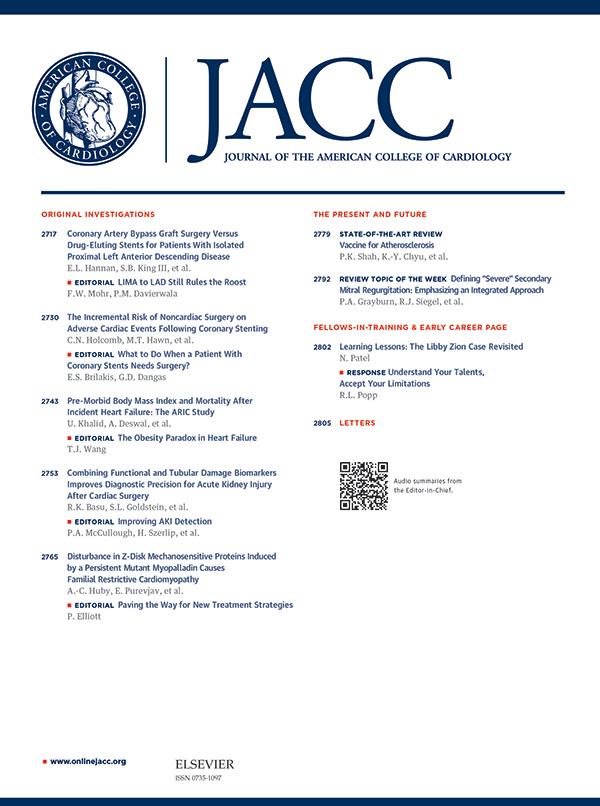Re-Evaluating Recurrent Events in Heart Failure Trials
IF 21.7
1区 医学
Q1 CARDIAC & CARDIOVASCULAR SYSTEMS
引用次数: 0
Abstract
Analyses using repeat hospitalizations (HFHs) are common in heart failure trials and typically assume that such repeat events occur randomly over time. Also, many think that using repeat events enhances statistical power. This article challenges those assumptions, using data from 4 heart failure trials of sodium-glucose cotransporter 2 inhibitors. We found marked within-patient time clustering of repeat events: risks of subsequent HFH and cardiovascular death are markedly elevated following a hospitalization, especially early on. The Lin-Wei-Yang-Ying and negative binomial models do not account for this. Alternative approaches using area under the curve and win ratio methods for the composite of cardiovascular death and all HFHs strengthened the treatment effect. But still, time-to-first event analyses tended to give the strongest evidence. Overall, some commonly used repeat event analyses appear not to be the best. It is time to rethink how best to use repeat events data in heart failure trials.

重新评估心力衰竭试验中的复发事件:模式、预后意义和分析改进
使用重复住院(HFHs)的分析在心力衰竭试验中很常见,通常假设这种重复事件随时间随机发生。此外,许多人认为使用重复事件可以增强统计能力。这篇文章挑战了这些假设,使用了4项钠-葡萄糖共转运蛋白2抑制剂心力衰竭试验的数据。我们发现重复事件在患者时间内有明显的聚类:住院后HFH和心血管死亡的风险明显升高,尤其是在早期。林-魏-阳-英模型和负二项模型不能解释这一点。采用曲线下面积法和胜比法对心血管死亡和所有HFHs的综合治疗效果增强。但是,时间到第一事件的分析倾向于给出最有力的证据。总的来说,一些常用的重复事件分析似乎不是最好的。是时候重新思考如何在心力衰竭试验中最好地使用重复事件数据了。
本文章由计算机程序翻译,如有差异,请以英文原文为准。
求助全文
约1分钟内获得全文
求助全文
来源期刊
CiteScore
42.70
自引率
3.30%
发文量
5097
审稿时长
2-4 weeks
期刊介绍:
The Journal of the American College of Cardiology (JACC) publishes peer-reviewed articles highlighting all aspects of cardiovascular disease, including original clinical studies, experimental investigations with clear clinical relevance, state-of-the-art papers and viewpoints.
Content Profile:
-Original Investigations
-JACC State-of-the-Art Reviews
-JACC Review Topics of the Week
-Guidelines & Clinical Documents
-JACC Guideline Comparisons
-JACC Scientific Expert Panels
-Cardiovascular Medicine & Society
-Editorial Comments (accompanying every Original Investigation)
-Research Letters
-Fellows-in-Training/Early Career Professional Pages
-Editor’s Pages from the Editor-in-Chief or other invited thought leaders

 求助内容:
求助内容: 应助结果提醒方式:
应助结果提醒方式:


